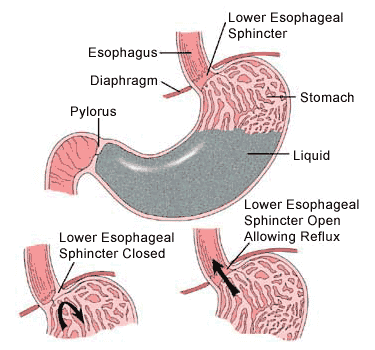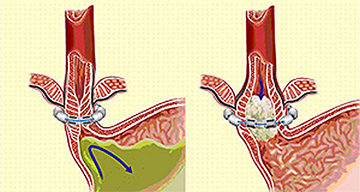For the 1 in 10 Americans who suffer from “heartburn” or occasional acid reflux, options and medications are plentiful, but for the 19 million Americans who suffer from severe acid reflux symptoms or GERD (gastroesophageal reflux disease), medicine simply isn’t enough.
Acid reflux and GERD are caused by a few factors. Excess acid produced in the stomach, either by natural chemistry or certain food stimuli is leaked into the esophagus through the esophageal sphincter, a ring-like muscle designed to keep acid and food out of the esophagus and in the stomach. If the sphincter relaxes, then acid can escape and cause pain and inflammation in the esophagus. Over a long period of time, occasional or frequent acid reflux can cause chronic inflammation in the esophagus called erosive esophagitis.
Eventually, due to prolonged exposure to stomach acid, the esophagus cells can start producing stomach acid itself, effectively turning esophagus cells into stomach cells. Chronic stomach acid in the esophagus can also eventually cause esophageal cancer.

There are countless medicines to treat excess acid and acid reflux including antacids like Tums and Pepsid, which counteract the extra acid in the stomach with added base chemicals. There are also a whole class of medications which act as proton-pump inhibitors, which prevent the stomach from making more acid. Proton-pump inhibitors include medicines like Prevacid, and the newly FDA approved Kapidex, which are approved to treat excess acid and erosive esophagitis. Even though medications target the excess acid, a faulty esophageal sphincter can still allow leaks.
Looking at GERD treatment from a different angle, are researchers from Torax Medical Inc., a medical device design company. They have recently announced launch of a study to examine the safety and efficacy of their own minimally invasive LINX™ Reflux Management System, a small implant, on patients who suffer from GERD and are still experience symptoms despite anti-acid medications.

The LINX Reflux Management System is a band of magnetic beads placed outside the lower esophagus and helps to support the function of the esophageal sphincter. Proper function of this sphinter allows for normal digestion, and also prevents stomach acid from leaking into the esophagus. Photo credit: UCSD News
Torax’s new acid-reflux treatment is designed to target faulty sphincters that continue to allow acid to leak into the esophagus. Their study will implant the LINX Reflux Management System laparoscopically, through a small incision in the abdomen. The device is a band of magnetic beads which are placed around the lower esophagus. After placement, the magnetic attraction of the beads supports the esophageal sphincter to avoid acid leakage, but also is flexible enough to allow for normal digestion.
Robert Ganz, M.D. of Minnesota Gastroenterology and a PrincipalTargeting faulty sphincters allows patients to be free of chronic acid reflux and without the side effects or long term consequences of anti-acid drug therapy and acid reflux.
Investigator in the trial said, "Many people who suffer from GERD do
not get complete relief of symptoms with drug therapy. The LINX System
is intriguing because it may provide both symptom relief and correction
of the physiologic defect."
References:
Web-MD, Heartburn Health Center
http://www.refluxstudy.com/
http://www.toraxmedical.com/






Comments